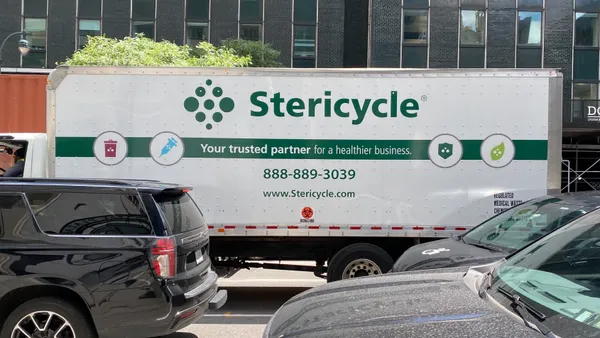Dive Brief:
- Chicago's Office of the Inspector General (OIG) released an audit report last week concluding the city's Department of Streets and Sanitation (DSS) is not adequately enforcing recycling in commercial buildings and large multi-family residences of five or more units. This category includes an estimated 41% of Chicago households and approximately 60,000 businesses.
- The OIG discovered DSS does not ensure haulers submit complete, accurate or timely annual reports detailing the buildings served and materials collected, as required by a city ordinance. DSS does not keep a list of buildings required to contract with haulers, and it does not have a way of issuing citations through its e-ticketing system to building owners.
- In response, DSS acknowledged it has not met its responsibilities for enforcing recycling in high-density buildings and instead has focused on running the city's blue cart program for smaller buildings. DSS said it will take corrective actions, including working with other departments to revise the citation process and adding recycling violations to the e-ticketing system.
Dive Insight:
Chicago's recycling rate hovers around 9%, known as one of the lowest for a major city in the country, and this new report heightens the pressure to make tangible progress.
DSS currently provides collection service for residential properties with up to four units, but it has oversight for all larger buildings. Multifamily buildings with five or more units, as well as commercial buildings, must contract with private haulers for waste and recycling collection.
Despite agreeing it hasn't met the mark in overseeing high-density building recycling, DSS said it doesn't intend to implement a proactive enforcement system until after receiving a consultant's comprehensive waste study results. Those results are expected sometime next year.
In response to questions, the OIG said it recommends designing better enforcement measures but action should be a combination of proactive and complaint-based enforcement. Proactive approaches could include DSS analyzing data from hauler reports it receives or targeting certain types of buildings.
Two Chicago aldermen speaking on "The Mike Nowak Show", a local environmental program, said DSS has all the data it needs and shouldn't wait for the consultant's report.
"Hopefully they'll fix some of this right away. There's no reason to wait on this study," said Alderman Michele Smith on Dec. 8, suggesting DSS may have not faced enough internal pushback in the past. "Government doesn't always move unless they have no other choice."
The OIG said DSS does lack some essential data, but the audit provided several recommendations that could be addressed near-term.
Smith and Alderman Scott Waguespack said decades of systemic problems are holding Chicago back from achieving greater recycling success.
"We really were kind of stunned about what was in the [OIG] report," Waguespack said on the show. "It was really... a lot of simple things that could have and should have changed for the city leadership in terms of recycling ... Why wouldn't people take these simple steps?"
The aldermen noted Mayor Lori Lightfoot, who took office in 2019, seems amenable to improving the system. However, digging through the layers of problems from previous administrations may prove difficult.
In the 1990s, Chicago started a blue bag recycling program that lasted for 13 years but largely is considered a failure because of low participation rates. The city introduced the current blue cart program on a limited scale in 2007 and expanded it to all households served by DSS in 2013.
Responsibility for enforcing recycling in larger buildings was transferred to DSS in 2011, after former Mayor Rahm Emmanuel disbanded the Department of the Environment, and the city strengthened that enforcement program with a 2017 ordinance update.
According to Chicago Recycling Coalition Vice President Carter O'Brien, this makes for an odd structure some view as a conflict.
"Why is DSS in charge of this in the first place when they don't service the [high-density] buildings? You're basically setting up a system by which... they are forced to divert resources and are responsible for enforcing and regulating the work of their competitors," he said. "We want to empower DSS. In many ways, they are doing the right things."
One of CRC's suggestions is to reposition the responsibility to another city agency that already does data collection, inspection and enforcement activities, such as the Department of Buildings. CRC would like to see the system become more transparent, with data posted online. They also suggests pursuing organics recycling in the future to improve Chicago's diversion rate.
Most of the city's waste comes from high-density buildings, Smith said, and sources view the lack of scrutiny on these locations as a key factor holding Chicago back. Still, the city's blue cart program is also seen as needing major improvements.
The Better Government Association released a report in 2018 illustrating serious shortcomings in that program around contract structures and contamination rejection practices. Earlier this year, DSS announced its plans for a new study and multiple aldermen called for public hearings to examine the system.
The OIG report has renewed that attention among local officials. Smith said the Chicago City Council's environmental committee chair will soon be sending a letter to the DSS commissioner laying out requested changes, such as asking haulers to supply a list of the buildings they service for recycling. The committee aims to have a hearing on recycling in January.











